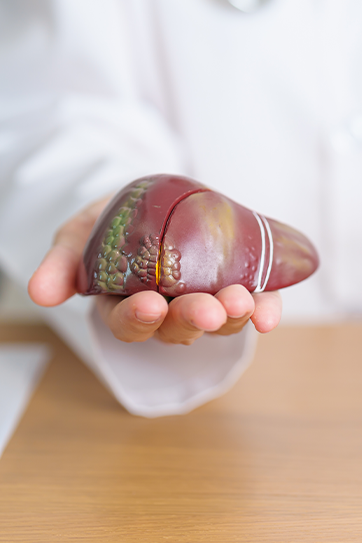Liver cancer is a type of cancer that originates in the liver, the largest internal organ. It typically arises due to the abnormal growth and multiplication of cells.
The treatment of liver cancer is determined based on the stage of the tumor, its size, and the overall health condition of the individual. Treatment options include surgical intervention (removal of the tumor), radiotherapy (radiation treatment), chemotherapy (drug treatment), radioembolization, and methods like radiofrequency ablation.
An appropriate treatment plan is determined by a multidisciplinary healthcare team and personalized according to the individual's specific condition. As with almost all cancer diseases, early diagnosis and proper treatment can lead to more positive outcomes in the fight against liver cancer.
The symptoms of liver cancer may not be prominent in the early stages of the disease. However, as the disease progresses, noticeable symptoms can aid in diagnosis. Common symptoms include abdominal pain, often resulting from the enlargement of the liver or pressure from tumors on surrounding tissues. The symptoms of liver cancer can be listed as follows:
Symptoms can vary from person to person and may, in some cases, be associated with other health issues. Therefore, consulting with a specialist when symptoms are observed is crucial. Early diagnosis can increase the chances of successful treatment and better management of the disease.
Liver cancer typically arises from a combination of factors, including genetic, environmental, and lifestyle-related elements. Chronic infections with hepatitis B or C viruses can increase the risk of liver cancer by causing inflammation of the liver and leading to the development of cirrhosis. Cirrhosis is a condition where healthy liver tissues are damaged and replaced by fibrosis. Prolonged excessive alcohol consumption can cause liver damage and increase the risk of liver cancer.
Long-term alcohol abuse can lead to liver damage and an increased risk of liver cancer. Obesity and diabetes can increase the risk of liver cancer by causing the accumulation of fat in the liver. Exposure to a fungus toxin called aflatoxin, particularly in Asia and Africa, can also increase the risk of liver cancer.
Genetic factors can influence the risk of liver cancer. Genetic conditions such as hemochromatosis, Wilson's disease, and alpha-1 antitrypsin deficiency can increase the likelihood of developing liver cancer. Hormonal changes, especially during pregnancy and prolonged use of birth control pills, can also affect the risk of liver cancer. The interaction of these factors plays a role in determining an individual's likelihood of developing liver cancer. However, regular health check-ups, managing risk factors, and adopting a healthy lifestyle can help reduce the risk of liver cancer.
The diagnosis of liver cancer is carried out through various medical tests and imaging methods. These methods help the doctor assess the individual's health condition and confirm the presence of cancer. Blood tests, liver function tests, and specific tumor markers in blood tests can evaluate liver health and indicate the presence of cancer.
Among the imaging methods are computed tomography (CT), magnetic resonance imaging (MRI), and ultrasonography. These methods can visually identify tumors and other abnormalities in the liver. Biopsy is a commonly used method for the definitive diagnosis of liver cancer. A small tissue sample is taken from the liver and examined in the laboratory to confirm the presence of cancer.
A surgical procedure called laparoscopy involves inserting a thin tube into the abdominal cavity to directly observe tumors in the liver and take biopsies. Additionally, positron emission tomography (PET) scans can be used to identify areas with concentrated cancer cells. The combination of these diagnostic methods helps determine the type, size, and stage of liver cancer, assisting in the creation of an appropriate treatment plan tailored to the individual's condition.
The treatment of liver cancer is determined based on the type of disease, its stage, overall health, and other individual factors. Usually, one or more treatment methods are used to determine the most suitable approach for the individual's condition. Surgical intervention can be performed for early-stage liver cancers to remove tumors. Surgical procedures may include liver resection, transplantation, or embolization of vessels feeding the tumor.
Radiation therapy aims to kill cancer cells or control their growth. However, radiation therapy plays a limited role in the treatment of liver cancer due to the liver's resistance to radiation. Chemotherapy is a treatment method used to kill or stop the growth of cancer cells. In some cases, chemotherapy alone may not be effective in liver cancer treatment and is often used in conjunction with other treatment options.
Targeted therapies focus on specific targets in liver cancer, affecting cancer cells while minimizing damage to healthy cells. Immunotherapy strengthens the body's immune system to target cancer cells. This is a potentially new approach that could be used in the treatment of liver cancer. For detailed information about liver cancer, you can contact Medwide.




Get practical information about the topics you are most curious about. Everything you need to make informed decisions on your beauty and health journey is here with all the details from A to Z.
Liver cancer is a treatable disease, but the success of treatment depends on factors such as the individual's overall health, tumor stage, and type. In cases diagnosed in the early stages, surgical intervention can increase the likelihood of curing liver cancer. Additionally, treatment options such as radiotherapy, chemotherapy, targeted therapies, and immunotherapy aim to control or regress the disease.
Liver cancer can occur at any age, but it is more commonly diagnosed in individuals aged 50 and above. Risk factors include chronic hepatitis infections, cirrhosis, alcohol abuse, obesity, diabetes, genetic factors, and certain liver diseases.
There is no specific herbal remedy or single healing food for liver cancer. However, adopting a healthy lifestyle and taking measures to support liver health can be beneficial. These measures include balanced nutrition, regular exercise, limiting alcohol consumption, getting hepatitis vaccines, maintaining a healthy weight, and avoiding smoking. Nevertheless, these measures do not eliminate the risk of liver cancer entirely; they only help reduce the risk. It is essential to consult with a healthcare professional for any health concerns.
Medwide meticulously arranges airport transfers for patients and their companions, ensuring their comfort and satisfaction.
Medwide's VIP transfer service offers patients a personalized and privileged travel experience, providing exceptional service.
Medwide transports patients and their companions comfortably and luxuriously, making their journeys enjoyable and relaxing.
Medwide offers quality healthcare services to patients at affordable prices, ensuring transparency and fairness in costs.
Medwide provides fast treatments by reducing patient wait times, our expert doctors promptly respond to our patients' needs.